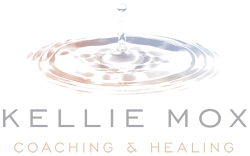“Trust your body more,” my husband offered during my moment of anxiety last week. “Think less.”
“I love it when you hand my words back to me,” I replied knowingly and appreciatively. He smirked. My husband often reminds me of what I already know and what I sometimes lose touch with when my nervous system gets triggered and old patterns come for a visit.
More and more I trust my body, and dwelling in this space of trust has been one of the most transformative shifts on my healing journey. Life continues to offer opportunities to deepen and expand this trust, which is where I am now—a moment of opportunity. I know I’m not alone. One of the foundations of my healing framework is self-trust, not just because it’s been powerfully healing for me to cultivate it, but also because I’ve witnessed how self-trust, and lack thereof, impacts other womxn’s health and well-being. That’s why I want to share some ideas about why it’s so hard for womxn to trust our bodies (and why it matters).

It’s Historical, Cultural, and Individual
Historical
I believe that, for womxn, our lack of trust in our bodies stems as much, if not more, from our historical and collective cultural experience as it does from our individual life experience. It’s hard for womxn to trust our bodies when we’ve been told for centuries that they’re dangerous or bad and then punished for it, too. Wise women and healers (witches) were considered a threat and burned at the stake for embodying their feminine gifts. In her book Patriarchy Stress Disorder, Valerie Rein, PhD reinforces that “Most women are constantly at war with our bodies. It’s not our fault. It’s the millenia of the war on women and our bodies, internalized.” (Rein, p. 79)
Cultural
Our modern day patriarchal culture also promotes collective distrust in our bodies because patriarchy inflicts trauma on womxn that breeds this mistrust. Trauma is more than catastrophic life events. It’s chronic stress stored in the body. It’s also anything that is too much, too fast, too soon. Trauma, according to Valerie Rein, is “any experience that made you feel unsafe in your fullest authentic expression and led to developing trauma adaptations to keep you safe.” (Rein, p. 18). It’s hard for womxn living in our patriarchal culture to feel safe being authentic when we’re told that our bodies, minds, and hearts are wrong. We’re bombarded by ads for products that will fix our wrinkles, dimples, and emotions. We’re disregarded and told the “doctor knows best” when we share the truth of our pain (see below for articles on this topic). Our innate feminine energy is devalued with a focus on logic over intuition, busy-ness over rest, and producing over nurturing.
*Note: I have a special interest in womxn’s health and healing, which is why I’m choosing to focus on womxn in this blog. I recognize men are negatively impacted by patriarchal culture and ideology as well.
Individual
We may also lack trust in our bodies through our own personal experiences as well. It can feel hard to trust our bodies when it’s not been modeled for us or when it seems our bodies have betrayed us. For myself and so many other womxn I know, we learned early on that it’s not safe to show up in our joy, beauty, carefree-ness, brilliance, because we’ve been burned, shut down, or violated when we show up so freely. So we protect ourselves, withholding our authentic expression. As developing girls and aging women, it may also feel like our changing bodies are betraying us. Whether it’s our appearance, chronic physical symptoms, or emotional experience, we learn to control rather than trust them, because controlling often feels like the safer option. We wind up living in and from our heads, our bodies becoming an afterthought. This perpetuates the cycle of mistrust in our bodies, as our bodies must work harder to get our attention, which can also feel scary and lead to even more self-protection and mistrust in our bodies.
Why it Matters
Trusting our bodies matters because we cannot experience the fullness of life we crave without it. Healing our bodies, minds, hearts, and souls rests, at least in part, on a healthy relationship with our bodies, one in which we trust their wisdom AND our bodies can trust us to take care of them as well. I’ve learned this through years of healing chronic illness, anxiety, and perfectionism (a trauma response in and of itself) and through witnessing the transformative power of self-trust for other womxn, too. And as we grow in trusting and honoring our bodies, we support other womxn in doing the same. We’re not only healing ourselves, we’re catalyzing healing for other womxn and dismantling the patriarchal ideology one phenomenal womxn at a time.

Self-Trust: A Place to Start
Your journey to trusting your body is an individual one. I can’t tell you exactly how to do it. As a coach, I catalyze the process by holding space, asking powerful questions, and offering ideas where appropriate and requested. I can tell you that nervous system education is one of my passions, and the nervous system is a great place to start when you’re beginning to work and play with cultivating greater trust between you and your body.
One of the most potent and simple practices that cultivates trust in our bodies is honoring our body’s impulses. When we do this, we’re letting the body know that it can trust us to take care of it. When we respond to our body’s needs with compassion and intention, when we listen to its messages, it doesn’t have to scream to be heard. These screams, which often appear as uncomfortable symptoms, can feel like a betrayal, such that we don’t trust our body’s wisdom. We judge and question the discomfort and perpetuate an antagonistic relationship with our bodies, but like a small child, our body is never bad. Like a child, when it’s acting up or acting out, it’s usually for a very good reason.
So, give this a try. It’s a practice. That means, you do it throughout your day, throughout your week, throughout your life. The shifts come with regular practice. *Note: Honoring physiological needs and somatic impulses is VERY different from indulging in a mental or emotional craving. If you need more clarification, watch this video.
§ Eat when you are physically hungry (keep healthy snacks with you so you can honor that hunger).
§ Stop eating when you are physically comfortable.
§ Drink water when you are thirsty (yes, it’s good to drink water all the time, but I’m emphasizing that you honor your thirst and honor it with hydrating fluids rather than with coffee, alcohol, or soda).
§ Eliminate when your body signals it’s time (don’t hold it until the meeting is done or the zoom call is finished).
§ Take a break if you feel sleepy (even five minutes laying flat on the floor or closing your eyes in your car is five minutes you are honoring your body’s need for rest).
§ Change position if you feel uncomfortable (move around and find a posture/position that your body can hold comfortably so you can be both alert and relaxed).


